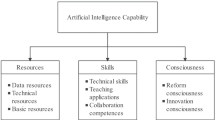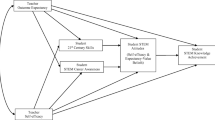Abstract
In the field of science education, laboratory learning environment has gained renewed interest in the recent decade. This study aimed to investigate the relationships among students’ conceptions of science laboratory learning, perceptions of the science laboratory learning environment, and their academic self-efficacy in science learning by adopting the structural equation modeling (SEM) technique. A total of 513 senior high school students (262 females) in Taiwan were invited to participate in this survey study. Three instruments were adapted and implemented to investigate the aim of the study (i.e. the conceptions of science laboratory learning questionnaire, the science laboratory environment inventory, and the academic self-efficacy in science learning questionnaire). The results indicated that the students’ conceptions of science laboratory learning made a significant contribution to their perceptions of the science laboratory environment, which consequently fostered their science learning self-efficacy. More specifically, students with conceptions of science laboratory learning as reviewing their prior learning profiles tended to highlight the “student cohesiveness,” “integration,” and “material environment” aspects of the laboratory environment. Moreover, students who held personal ideas of science laboratory learning as acquiring manipulative skills tended to perceive actual science laboratory environments as much more open-ended and to attain advanced academic science learning self-efficacy. In addition, those students who viewed laboratory learning as achieving in-depth understanding, and who perceived that laboratory activities are guided by clear rules, were prone to express a stronger sense of academic self-efficacy. Based on the results, practical implications and suggestions for future research are discussed.



Similar content being viewed by others
References
Aldridge, J. M., Fraser, B. J., Taylor, P. C., & Chen, C.-C. (2000). Constructivist classroom learning environments in a cross-national study in Taiwan and Australia. International Journal of Science Education, 22, 37–55.
Alt, D. (2015). Assessing the contribution of a constructivist learning environment to academic self-efficacy in higher education. Learning Environment Research, 18, 47–67.
Andrew, S. (1998). Self-efficacy as a predictor of academic performance in science. Journal of Advanced Nursing, 27, 596–603.
Bandura, A. (1997). Self-efficacy: The exercise of control. New York: Freeman.
Bentler, P. M. (1990). Comparative fit indexes in structural models. Psychological Bulletin, 107, 238–246.
Biggs, J. (1993). From theory to practice: A cognitive systems approach. Higher Education Research and Development, 12, 73–85.
Blanchard, M. R., Southerland, S. A., Osborne, J. W., Sampson, V. D., Annetta, L. A., & Granger, E. M. (2010). Is inquiry possible in light of accountability? A quantitative comparison of the relative effectiveness of guided inquiry and verification laboratory instruction. Science Education, 94, 577–616.
Bong, M. (2001). Between- and within-domain relations of academic motivation among middle and high school students: Self-efficacy, task-value, and achievement goals. Journal of Educational Psychology, 93, 23–34.
Chen, S., Huang, C.-C., & Chou, T.-L. (2016). The effect of metacognitive scaffolds on low achievers’ laboratory learning. International Journal of Science and Mathematics Education, 14, 281–296.
Chiou, G.-L., Lee, M.-H., & Tsai, C.-C. (2013). High school students’ approaches to learning physics with relationships to epistemic views on physics and conceptions of learning physics. Research in Science & Technological Education, 31, 1–15.
Chiu, Y.-L., Lin, T.-J., & Tsai, C.-C. (2016). The conceptions of learning science by laboratory among university science-major students: Qualitative and quantitative analyses. Research in Science & Technological Education, 34, 359–377.
Dart, B. C., Burnett, P. C., Purdie, N., Boulton-Lewis, G., Campbell, J., & Smith, D. (2000). Students’ conceptions of learning, the classroom environment, and approaches to learning. The Journal of Educational Research, 93, 262–270.
Ferla, J., Valcke, M., & Schuyten, G. (2008). Relationships between student cognitions and their effects on study strategies. Learning and Individual Differences, 18, 271–278.
Fraser, B. J., & Lee, S. S. U. (2009). Science laboratory classroom environments in Korea. Learning Environments Research, 12, 67–84.
Fraser, B. J., McRobbie, C. J., & Giddings, G. J. (1993). Development and cross-national validation of a laboratory classroom environment instrument for senior high school science. Science Education, 77, 1–24.
Grabau, L. J., & Ma, X. (2017). Science engagement and science achievement in the context of science instruction: A multilevel analysis of U. S. students and schools. International Journal of Science Education, 39, 1045–1068.
Henderson, D., Fisher, D., & Fraser, B. (2000). Interpersonal behavior, laboratory learning environments, and student outcomes in senior biology classes. Journal of Research in Science Teaching, 37, 26–43.
Hofstein, A., & Lunetta, V. N. (2004). The laboratory in science education: Foundation for the 21st century. Science Education, 88, 28–54.
Hu, L.-T., & Bentler, P. M. (1999). Cutoff criteria for fit indices in covariance structure analysis: conventional criteria versus new alternatives. Structural Equation Modeling, 6, 1–55.
Joo, Y. J., Bong, M., & Choi, H.-J. (2000). Self-efficacy for self-regulated learning, academic self-efficacy, and Internet self-efficacy in Web-based instruction. Educational Technology Research and Development, 48, 5–17.
Kline, R. B. (1998). Principles and practice of structural equation modeling. New York: Guilford Press.
Lee, M.-H., Johanson, R. E., & Tsai, C.-C. (2008). Exploring Taiwanese high school students’ conceptions of and approaches to learning science through a structural equation modeling analysis. Science Education, 92, 191–220.
Lee, M.-H., Chang, C.-Y., & Tsai, C.-C. (2009). Exploring Taiwanese high school students’ perceptions of and preferences for teacher authority in the earth science classroom with relation to their attitudes and achievement. International Journal of Science Education, 31, 1811–1830.
Lee, M.-H., Lin, T.-J., & Tsai, C.-C. (2013). Proving or improving science learning? Understanding high school students’ conceptions of science assessment in Taiwan. Science Education, 97, 244–270.
Lin, Y.-H., Liang, J.-C., & Tsai, C.-C. (2012). The effects of different forms of physiology instruction on the development of students’ conceptions of and approaches to science learning. Advances in Physiology Education, 36, 42–47.
Lin, T.-J., & Tsai, C.-C. (2013). An investigation of Taiwanese high school students’ science learning self-efficacy in relation to their conceptions of learning science. Research in Science & Technological Education, 31, 308–323.
Lorsbach, A., & Jinks, J. (1999). Self-efficacy theory and learning environment research. Learning Environments Research, 2, 157–167.
MacCallum, R. C., Browne, M. W., & Sugawara, H. M. (1996). Power analysis and determination of sample size for covariance structure modeling. Psychological Methods, 1, 130–149.
Marton, F. (1981). Phenomenography—describing conceptions of the world around us. Instructional Science, 10, 177–200.
Marton, F., Dall’Alba, G., & Beaty, E. (1993). Conceptions of learning. International Journal of Educational Research, 19, 277–299.
Moos, R. H. (1974). The Social Climate Scales: an overview. Palo Alto, CA: Consulting. Psychologists Press.
Pajares, F., & Miller, M. D. (1994). Role of self-efficacy and self-concept beliefs in mathematical problem solving: A path analysis. Journal of Educational Psychology, 86, 193–203.
Pajares, F., & Schunk, D. H. (2001). Self-beliefs and school success: Self-efficacy, self-concept, and school achievement. In R. Riding & S. Rayner (Eds.), Self-perception (pp. 239–266). London: Ablex Publishing.
Peterson, E. R., Brown, G. T. L., & Irving, S. E. (2010). Secondary school students’ conceptions of learning and their relationship to achievement. Learning and Individual Differences, 20, 167–176.
Pintrich, P. R., Smith, D. A. F., Garcia, T., & McKeachie, W. J. (1993). Reliability and predictive validity of the motivated strategies for learning questionnaire (MSLQ). Educational and Psychological Measurement, 53, 801–813.
Saklofske, D. H., & Greenspoon, P. J. (2000). Confirmatory factor analysis of the MSLSS: A reply to Shevlin et al. Personality and Individual Difference, 28, 187–190.
Shen, K.-M., Lee, M.-H., Tsai, C.-C., & Chang, C.-Y. (2016). Undergraduate students’ earth science learning: relationships among conceptions, approaches, and learning self-efficacy in Taiwan. International Journal of Science Education, 38, 1527–1547.
Tsai, C.-C. (2003). Taiwanese science students’ and teachers’ perceptions of the laboratory learning environments: Exploring epistemological gaps. International Journal of Science Education, 25, 847–860.
Tsai, C.-C. (2004). Conceptions of learning science among high school students in Taiwan: aphenomenographic analysis. International Journal of Science Education, 26, 1733–1750.
Tsai, C.-C., Ho, H. N., Liang, J.-C., & Lin, H.-M. (2011). Scientific epistemic beliefs, conceptions of learning science and self-efficacy of learning science among high school students. Learning and Instruction, 21, 757–769
Wang, C.-Y., Wu, H-K, Lee, S. W.-Y., Hwang, F.-K., Chang, H.-Y., Wu, Y.-T., Chiou, G.-L., Chen, S., Liang, J.-C., Lin, J.-W., Lo, H.-C., & Tsai, C.-C. (2014). A review of research on technology-assisted school science laboratories. Educational Technology & Society, 17, 307–320.
Acknowledgments
This work was financially supported by the “Institute for Research Excellence in Learning Sciences” of the National Taiwan Normal University (NTNU) from The Featured Areas Research Center Program within the framework of the Higher Education Sprout Project by the Ministry of Education (MOE) in Taiwan and by the Ministry of Science and Technology, Taiwan, under the following grant numbers: 106-2628-S-003-002-MY3, 102-2511-S-003-065-MY5.
Author information
Authors and Affiliations
Corresponding author
Rights and permissions
About this article
Cite this article
Lee, MH., Liang, JC., Wu, YT. et al. High School Students’ Conceptions of Science Laboratory Learning, Perceptions of the Science Laboratory Environment, and Academic Self-Efficacy in Science Learning. Int J of Sci and Math Educ 18, 1–18 (2020). https://doi.org/10.1007/s10763-019-09951-w
Received:
Accepted:
Published:
Issue Date:
DOI: https://doi.org/10.1007/s10763-019-09951-w




